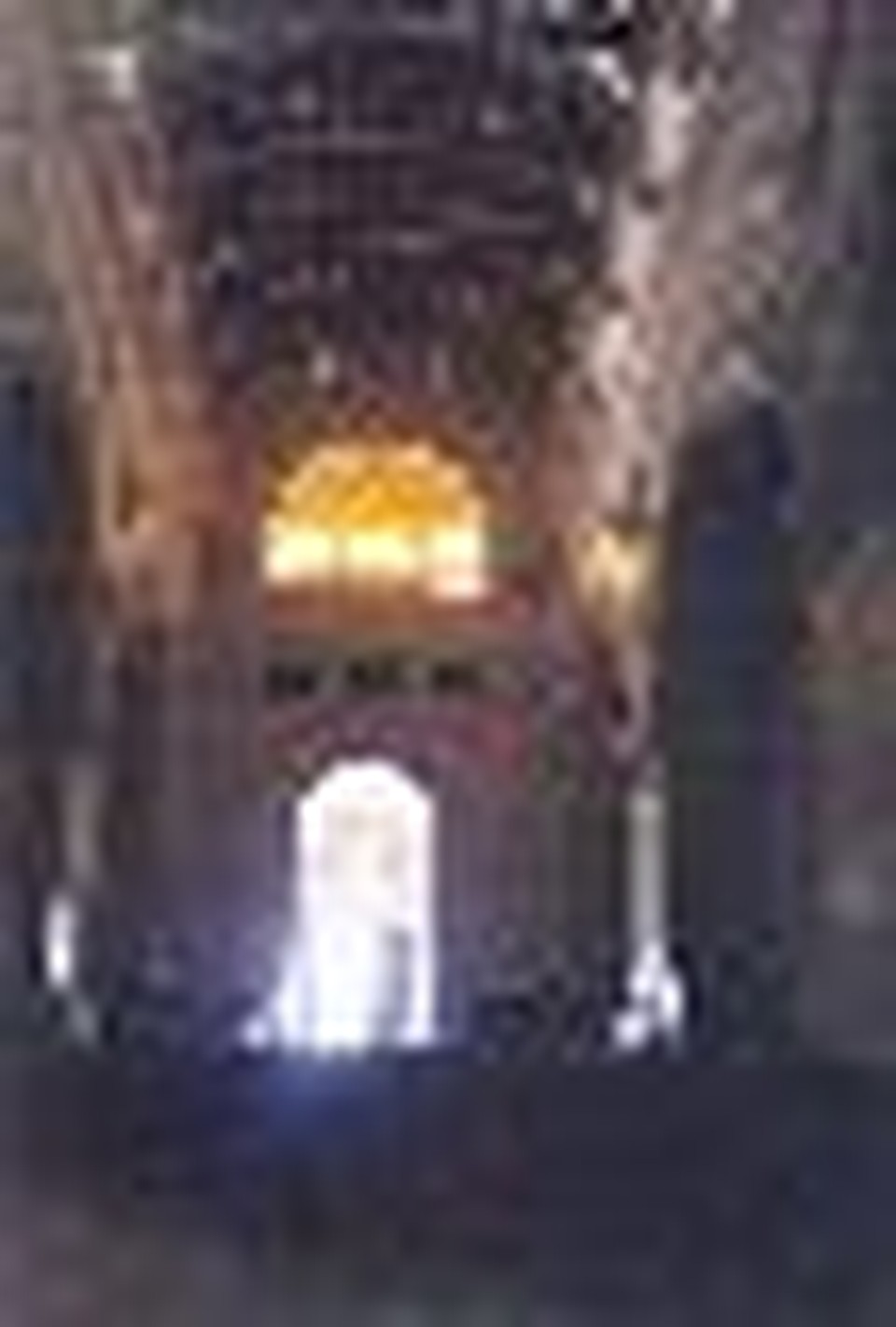Falling into the Bible 3 -- Mt. Tabor; Above All, Jesus!

In June 2002, author Eva Marie Everson toured the Holy Land as a journalist and photojournalist. For eight weeks Crosswalk.com will feature articles taken from her journal, as a Christian who "fell into the Bible." Use them in your own study time or as a group, focusing on what the Bible says, and then-using the reflections at the end-think about what it means to you personally.
One of the first things one notices when arriving in Israel is that--contrary to the popular opinion of my previously uninformed brain--it is not straight desert, flat and dotted by slow-moving camels and the occasional field of olive trees. This is rich, lush land with rolling hills, breathtaking bodies of shimmering water, snowcapped mountains, and productive patchwork acres of agriculture.
On the first leg of our journey into the "land of the Bible," we left Nazareth and Mary's Well for Mount Tabor (pronounced taa-BORE) as we trekked closer to the Sea of Galilee. Our van wove around the twists and turns in the road like a roller coaster at Six Flags as our guide, Miriam, began to tell her seven "students" the history of this "very large mountain."
Biblical History
Mount Tabor gets its first "claim to fame" in the book of Judges, the second book after the Books of Moses (The Pentateuch); most noted as the one that deals with the on-again, off-again relationship the freed Hebrew slaves -- now warriors -- had with God once they'd reached and settled into The Promised Land.
This is the story of a prophetess named Deborah, a soldier named Barak, a mountain called Tabor, and -- like the story of Joshua and Hazor -- a king named Jabin. This new king was a descendent of the Jabin whose city Hazor was burned to the ground in Joshua 11.
The new city of Hazor where this new King Jabin reigned was rebuilt on the old destroyed site of the original city by the same name. Previous to the story of Deborah and Barak, the Israelites had a period of "on again" relationship with God, but at the beginning of Judges 4, we read that, again, the people of Israel had forgotten the importance of relationship with the Almighty One.
The LORD sold them into the hands of Jabin, a king of Canaan, who reigned in Hazor. The commander of his army was Sisera, who lived in Harosheth Haggoyim. Because he had 900 iron chariots and had cruelly oppressed the Israelites for 20 years, they cried to the LORD for help. Deborah, a prophetess...was leading Israel at that time...She sent for Barak...and said to him, "The LORD , the God of Israel, commands you: 'Go, take with you ten thousand men...and lead the way to Mount Tabor." (excerpts from Judges 4:1-6 NIV)
Barak wasn't 100 percent up for the task and said to Deborah, ""If you go with me, I will go; but if you don't go with me, I won't go." (vs. 8) Deborah agrees, but not before admonishing Barak about the consequences of his lack of faith. "Because of the way you are going about this, the honor will not be yours, for the LORD will hand Sisera over to a woman." (vs. 9)
Barak brought his troops together --10,000 men strong -- and, along with Deborah, they climbed to the top of Mount Tabor. When Sisera heard that they had encamped there, he gathered his men together along with nine hundred iron chariots and headed toward the mountain to quell any thoughts of an uprising.
Instead, as soon as Deborah received her orders from God, she said to Barak, "Go! This is the day the LORD has given Sisera into your hands." (vs. 14) On those orders, Barak led ten thousand men down the side of the imposing 1,843-foot mountain, routing Sisera's army. Sisera, in the meantime, jumped off his chariot and ran into the tent of a woman named Jael, who gave him something to drink, put him to bed, and then ever-so-sweetly drove a stake through his head, killing him. (That'll do it.)
From that day on, the strength of the Israelites became stronger and they eventually overtook King Jabin, living once again in right relationship with God.
While the impressive mountain called Tabor, which seems to simply burst out of the plains that surround it, is mentioned a few more times in the Old Testament scriptures (David declares in Psalm 89 that both Mount Tabor and Mount Hermon will sing the praises of God, while Jeremiah talks about its great height in Jeremiah 46.), there is no mention of it in the New Testament.
However, according to tradition, it is to Mount Tabor that Jesus took three of His disciples to witness the event known as The Transfiguration. (Other traditions state that it was Mount Hermon. As in the story of Mary's message from Gabriel, Scripture is not exact as to location, though writings such as those by Josephus indicate that it could not have been Tabor, but in fact, Hermon.)
About eight days after Jesus said this, he took Peter, John and James with him and went up onto a mountain to pray. As he was praying, the appearance of his face changed, and his clothes became as bright as a flash of lightning. Two men, Moses and Elijah, appeared in glorious splendor, talking with Jesus. They spoke about his departure, which he was about to bring to fulfillment at Jerusalem. ~~Luke 9: 28-31NIV)
Anyone who has ever studied Peter even remotely is not shocked at what happened next. "Impetuous Pete," he might have been called. Like most Galilean fishermen, he tended to speak and act with an attitude that oft-times got him into trouble. He also put his mouth in gear before he put the key into the ignition of his brain. The incident here was no exception, but it proves the awesomeness of the experience. He had followed Jesus up a mountain to pray and had the climb of a lifetime!
Peter and his companions were very sleepy, but when they became fully awake, they saw his glory and the two men standing with him. As the men were leaving Jesus, Peter said to him, "Master, it is good for us to be here. Let us put up three shelters--one for you, one for Moses and one for Elijah." (He did not know what he was saying.) ~~Luke 9: 32-33
No sooner had Peter said this, than Father God Himself said, "This is my Son, whom I love; with him I am well pleased. Listen to him!" ~~Matthew 17: 5 NIV This is the last time we hear the voice of Father God in scripture.
Falling In
Today the Basilica of the Transfiguration, a magnificent work of architecture, artwork, historical remnants, gardens, and paths surrounded by an awesome panorama, sits atop Mt. Tabor, as a memorial to the events that took place in the above-mentioned scriptures.
As I walked toward the church I experienced a sense of wonder at God's vista. Inside was no different. I made my way down a center aisle, now alone with the exception of one of my tour mates. We walked silent between wooden benches flanked by ornate columns and archways. I moved toward the central altar; it requires going down a set of stairs and once there I stared up at the curve of the apse where, on background of gold, a painting of the Transfiguration is found.
Bright, shining as the sun stands Jesus, flanked by Moses and Peter on one side, Elijah, James, and John on the other.
After standing wordless (for who could speak under such a work of art?), I turned to head back up the steps, down the long center aisle, and out the door, when my eye caught a vision coming from the front doorway. It was only the brightness of the sun forcing its way through the half-open doorway, but to me it was a reminder of who God is and who I desire Him to be in me.
I raised my camera slowly, as though to be quick would stop the moment, snapped the shot and prayed it would come out as I had seen it.
It did, and when I look at it now I think about myself and about Barak and Deborah and Peter and how I am so like them all. Quick to put God second...quick to doubt...quick to fear...quick to say the wrong things, though I suppose it's easy to try to make something natural out of what is Supernatural.
But neither story of Mt. Tabor, whether confirmed or unconfirmed in terms of location, are of man. They are solely of God, as everything in our lives should be.
Like Israel, we all find ourselves "falling away" from a relationship with the One who has freed us. At the very least we will, from time to time, put that relationship on the backburner of our daily lives. There's so much on our calendars. Work, home, family, social obligations and, heaven help us, even the commitments we've made to our churches and church families.
I distinctly remember the evening I was driving to my church for a commitment I'd worked hard on for 2-1/2 years. In the quiet of my car, I heard God's still, small voice whisper, "You never talk to me anymore...."
"Talk to you?" I retorted aloud. "Talk to you? I'm doing all this work for you!"
It was no sooner out of my mouth but what I clamped my hand over my lips and said, "Oh, dear Father...I'm so sorry, I'm so sorry, I'm so sorry...."
That evening, I "resigned" from my position to the commitment and, for the next 2-1/2 years, did nothing by way of such obligations but to spend time on His holy mountain!
Like Barak, I had to learn to find trust and relationship with God and climb to a height I would have never imagined myself on top of until it was time to run down the hill in victory, ready to rout the enemy.
Like Peter, my desire is to follow the Lord in prayer, to be right where He is, no matter where the location, because really, does it matter if the transfiguration took place on Mt. Tabor or Mt. Hermon? Isn't it the point that going to the heights in prayer with God results in shedding light to God's almighty power, transforming power from His Spirit to our bodies, enabling us to fight the battles ahead, whether those of life or of death?
And this is part of what I learned when I fell into the Bible.
Eva Marie Everson is the author of Shadow of Dreams & Summon the Shadows. She is an award-winning national speaker. She can be contacted at Bridegroomsbride@aol.com
Originally published October 09, 2002.




